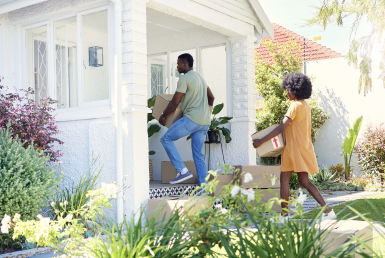What South Africans are spending more money on than they were a year ago?

25 Mar 2021
It is just over a year since South Africa went into hard lockdown. An expected 21 days of Stay at Home has turned into life with a pandemic and what we’ve come to know as normal is constantly being redefined.
The South African economy is clawing its way back to pre-lockdown levels, then already in a technical recession, with the lag factors of energy production weighing heavily on any growth.
READ: SARB to hold rate but hike around the corner – expert panel
The last two quarters of the 2021 financial year has had everyone in the property industry astonished at what an interest rate cut of 3.5% could achieve. The notion of pent-up demand has long been thrown out the window with everyone now asking how long this trend will continue.
A year later, South Africans continue to shuffle the residential property market. They are either downscaling due to financial constraints or spurring existing semigration trends to new heights as the shift in remote working has buyers looking for more space and an improved lifestyle as they work from home.
‘1.5% increase in the amount of first-time home buyers’
Shaun Rademeyer, CEO of MultiNET Home Loans, believes that we will continue to see this property boom in the residential space throughout the 2022 financial year – we have already noted 1.5% increase in the amount of first-time homebuyers, as well as an increase in average approved loans to property value.
“March is the start of the new financial year for SA as a whole, and we can already see that the home loan submissions have almost doubled compared to the same time last year. Yes, the last week of March last year was the start of our lockdown and the increase is taking this into account, however, we are already 27% above the previous year’s average.
Leadhome says data analysis shows the reasons why people are selling right now appear to be on opposite ends of the spectrum as some look to downscale due to financial pressures, while those who are more financially secure are looking for their upgrade property.
READ: Why are South Africans selling their homes right now?

The middle market continues to be the driver of the price increase, even though we have seen a slight slowdown from 2020. The average price submitted has increased by 5% versus the previous year’s 10% growth. But we must remember that the consumer market is still under pressure and the increase we seeing is the percentage of property moving in the higher price bracket of R1.2 million to R1.5 million, this market has gained the most since the reduction in interest rates. Buyers do have an advantage though in that we have seen the Prime Plus Interest Rate decrease from 1.62% to 0.49% which should ease the repayment burden somewhat on home buyers.
Rising industrial market but commercial property recovery to pre-lockdown levels slow going
Recent economic numbers suggest very little recovery progress is expected early in 2021 for South Africa’s Commercial Property classes though. This is according to the 1st Quarter 2021 FNB Commercial Property Broker Survey that surveys broker perceptions of buying/selling market activity by the Industrial, Retail and Office Property Classes.
John Loos, FNB Property Sector Strategist suggests that despite rising activity levels, “achieving further strengthening in Commercial Property Market activity levels could be tough going, especially in the Office Market with its recent major employment decline along with the big WFH structural change”.
Unlike the interest-rate-sensitive residential property, the Commercial Property Market typically tracks the economy’s movements more closely, and this appears to again be the case. The fact that the activity ratings are rising but not yet back to “fully recovered”, ie pre-lockdown levels, appears more-or-less reflective of recent economic data, says Loos.
Real GDP (Gross Domestic Product) growth remained negative in the final quarter of 2020 at -4.13% year-on-year, which is significantly better than the -17.78% 2nd quarter 2020 drop, but at the same time also not “fully” recovered.
‘Office Property Market seen as the under performer’
Concerning relative performances of property sectors, the brokers now appear to see the Office Property Market as becoming the underperformer of the 3 markets, with the Retail Property Market recovering more noticeably after a very poor 2020.
The Industrial Property Market recorded the highest activity rating to the tune of 5.44 on a scale of 1 to 10, the Retail Property Market 4.18, while the beleaguered Office Property Market was the weakest with a lowly 3.39 rating.
‘Industrial sector positive due to greater move to online retail’
The brokers perceive all 3 sectors to have been heavily impacted by lockdown and the resultant deep recession. However, they implicitly explain their greater optimism in Industrial Property as due in part to its greater affordability compared to the other 2 property sectors. In addition, they believe that an additional source of demand for Industrial emanates from a greater move to online retail, necessitating increased warehousing and logistics space.
“They don’t however, perceive retail property to be as challenged by technological progress and online retail as what they perceive office space to be from the lockdown-induced surge in working from home (WFH) and the great success thereof.
However, the retail sector continues to experience severe weakness, as at December 2020 in the Restaurant, Catering and Take-Aways Retail Sector, whose sales was still down -27.5% year-on-year. This sector was hampered by social distancing restrictions as well as a severe dent to consumer purchasing power during the deep 2020 recession, which typically leads to weak spending on non-essentials such as eating out or take-aways.
READ: SA relocation trend | Here’s where buyers are investing in new homes
FNB Credit Card Spend data shows much of the weakness in consumer spending was more outside of the retail shopping centres, while certain ‘‘in centre’’ consumer spending categories actually performed fairly well.
With weak economic activity and high levels of remote working, fuel credit card spend in January 2021 was only 84% of January 2020.
By comparison, some of the major more ‘‘in centre’’ spending items saw stronger performance, Grocery spend at 104% of January 2020, General Retail at 111%, Medical and Pharmaceuticals at 118%, Hardware and Furniture at 118%, and even the weakish Clothing and Apparel category fairly respectable at 98% of January a year prior. It was really the ‘‘Eating Out and Entertainment’’ card spend category which was still very weak at 82% of January 2020.

‘Office-bound companies expected to revise their office space needs’
Over 40% of brokers surveyed see office-bound companies revising their office space needs and in many cases downscaling.
Loos says the planned downscaling is not only due to greater levels of WFH. “Office space demand is also heavily influenced by employment trends in Finance, Real Estate and Business Services (FREBS) Sector, and this sector’s employment dropped by a massive -7% year-on-year in the 2nd and 3rd quarters of 2020. This alone is likely to translate into a significant drop in office space required by the sector.
What lies ahead for the next six months?
Loos says, “Looking ahead at the near term, the brokers are most upbeat about Industrial Property, and this is the property category whose market activity they, on average, expect to increase the most in the next 6 months. A more mild positive increase is expected for the Retail Property Market and a decline in Office Market Activity.”
For Rademeyer the expected market slow down is unfortunate, as the “economy will not be growing fast enough to sustain the demand”.
READ: Want to find out what homes actually sold for?
“As we move through the property cycle in the latter part of this year, we will find that supply will start surpassing demand and property prices could come under pressure again. The banks’ payment holidays are coming to an end and many developments that stood still during lockdown will be launching in the market.
“However we will still look forward to a good year and expect to assist many as they purchase the first, second or even fourth homes,” says Rademeyer.
Source: Property24




